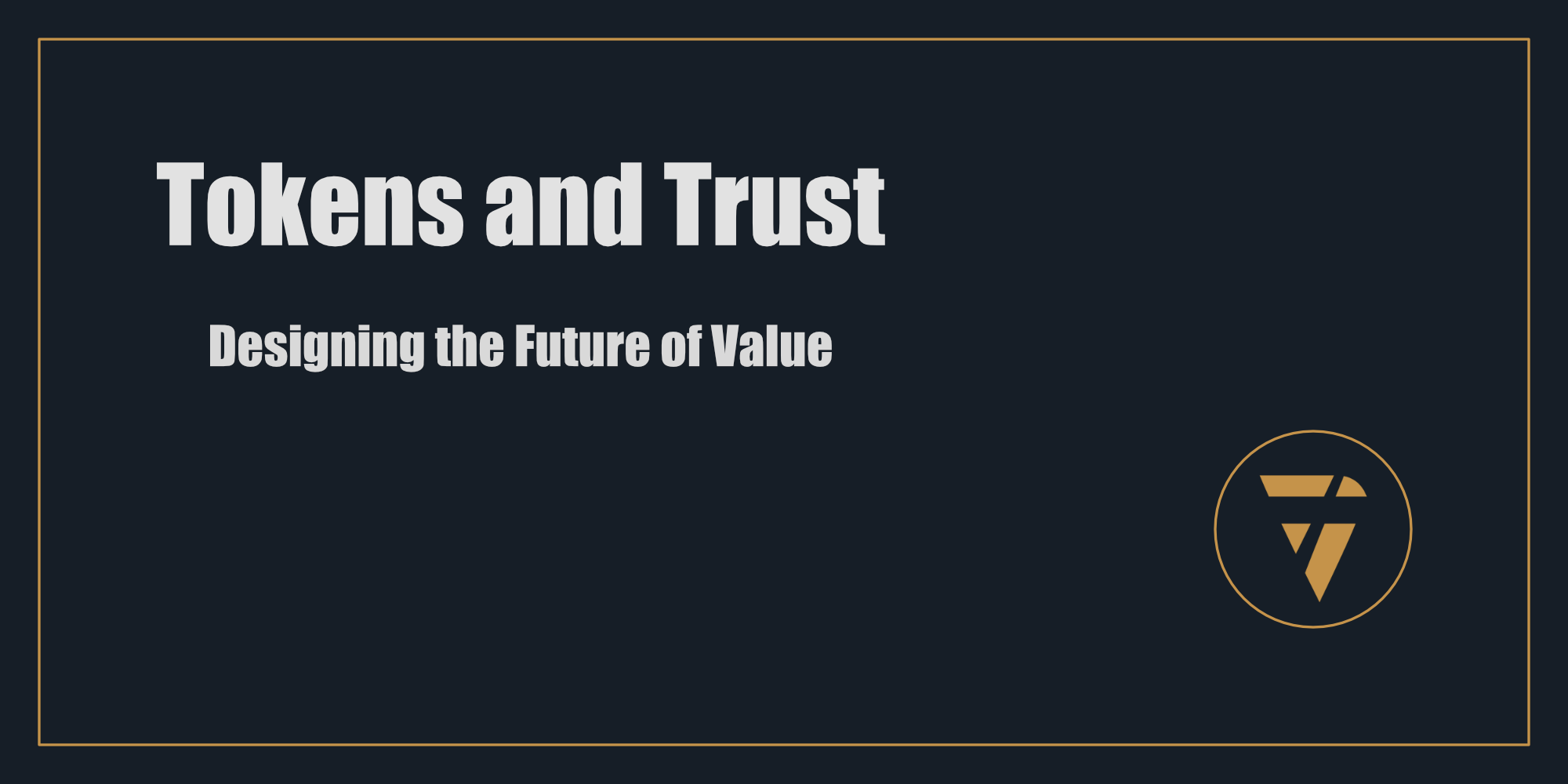Tokens and Trust
Designing the Future of Value

In a world where currency transcends paper and borders, the true value lies not in the tokens themselves but in the economies they build. Tokenomics isn’t just about creating wealth—it’s about redefining how we connect, collaborate, and exchange in a digital-first world.
The Hidden Engine Behind Crypto’s Success
Imagine an ecosystem where value flows without intermediaries, trust is established without middlemen, and collaboration replaces competition. This isn’t some utopian vision of a distant future—it’s the reality being shaped by tokenomics today.
Tokenomics, the economic framework behind cryptocurrencies and blockchain-based platforms, is quietly powering a revolution in how we create, distribute, and sustain value in the digital age.
But tokenomics isn’t just about numbers, charts, or supply caps. It’s a deeper exploration of human behaviour, a bridge between the mathematical precision of algorithms and the messy, unpredictable nature of our desires, fears, and motivations.
If blockchain is the skeleton, tokenomics is the heartbeat—ensuring systems remain alive, adaptive, and relevant.
Tokenomics: Math Meets Human Nature
At its core, tokenomics answers two critical questions:
- How do we incentivize people to participate in a network?
- How do we ensure that participation is sustainable over time?
The answers lie in aligning incentives—a delicate dance between economic principles and behavioural psychology. Bitcoin, for instance, didn’t just create a decentralized currency; it designed a system where miners (participants) are rewarded for securing the network. Ethereum added utility to tokens, allowing them to power decentralized applications. These designs didn’t happen by chance; they were crafted to harness collective human behaviour and channel it toward specific outcomes.
Yet, as the ICO boom of 2017 painfully demonstrated, poorly designed tokenomics can lead to catastrophic failure. Projects raised billions, only to collapse under unsustainable models that incentivized speculation over real utility. The lesson? Tokenomics is not just a science—it’s an art. And mastering it requires understanding the nuances of both markets and people.
The Building Blocks of Tokenomics
Every tokenized system, from Bitcoin to play-to-earn games, is built on a foundation of interlocking components:
- Creation: How tokens come into existence, whether through mining, staking, or minting.
- Distribution: How tokens are allocated—fair launches, airdrops, or pre-sales—and the impact these choices have on decentralization.
- Utility: The purpose of the token. Is it currency? Governance? Access? Rewards?
- Incentives: The rules of engagement. How are users rewarded, and what behaviours are penalized?
- Management: Governance mechanisms that allow the community to make decisions, adapt to changes, and resolve disputes.
The interplay between these elements determines whether a token economy thrives or crumbles. A well-designed tokenomics system doesn’t just attract users—it converts them into collaborators, investors, and evangelists.
Real-World Examples of Tokenomics in Action
To understand the power of tokenomics, let’s explore three case studies:
Bitcoin: Scarcity and Trust
With its fixed supply of 21 million coins, Bitcoin introduced digital scarcity, creating a trustless store of value. Its halving mechanism ensures that rewards decrease over time, incentivizing early adoption while maintaining long-term stability.
Ethereum: Utility Drives Adoption
Ethereum’s tokenomics introduced gas fees—small payments required to execute transactions or smart contracts. This utility gave Ether intrinsic value beyond speculation, fueling its adoption as the backbone of decentralized applications.
Axie Infinity: Gamifying Incentives
Axie Infinity demonstrated how tokenomics could revolutionize gaming. Players earned tokens for in-game achievements, which could be traded for real-world value. However, its rapid rise also exposed the risks of unsustainable rewards, leading to a re-evaluation of its economic model.
The Challenges of Tokenomics
While tokenomics offers unparalleled opportunities, it also presents significant challenges:
- Regulation: Governments are grappling with how to classify tokens—are they securities, commodities, or something entirely new?
- Speculation: Many token models incentivize early hype but lack long-term utility, leading to volatile markets.
- Fairness: Ensuring equitable distribution while avoiding centralization remains a complex puzzle.
- Sustainability: Overly generous rewards can attract users initially but drain resources, leading to collapse.
These challenges aren’t just theoretical—they have real-world implications for developers, investors, and communities. Addressing them requires a combination of ethical design, transparent governance, and adaptive mechanisms that evolve with the ecosystem.
The Future of Tokenomics
As blockchain technology matures, so too will the field of tokenomics. Emerging trends include:
- Social Tokens: Empowering creators and communities to monetize engagement directly with their audiences.
- Decentralized Governance: Experimenting with DAOs (decentralized autonomous organizations) to create more democratic decision-making structures.
- Programmable Economies: Leveraging smart contracts to automate complex economic interactions, from decentralized insurance to fractional ownership.
- Regenerative Finance (ReFi): Using tokenomics to address global challenges like climate change, enabling users to earn rewards for sustainable actions.
Tokenomics is no longer confined to cryptocurrencies—it’s shaping the future of industries, from finance and healthcare to gaming and entertainment. The systems we design today will define how we live, work, and exchange value tomorrow.
Your Role in the Tokenomics Revolution
Whether you’re a developer crafting the next big protocol, an investor evaluating projects, or simply an enthusiast exploring this space, tokenomics is the foundation upon which this revolution rests. It’s not just about making money—it’s about creating value, aligning incentives, and building systems that empower people.
The question isn’t whether tokenomics will reshape our world—it’s how we can shape it to be equitable, sustainable, and impactful. The future of value is being written right now. Are you ready to be a part of it?
This Substack is reader-supported. To receive new posts and support my work, consider becoming a free or paid subscriber.
This is what I’m working on. Tell me what you think, I enjoy the conversation! Subscribe and follow the work in real time.
Thanks!
B
Tokens don’t build communities, shared value does.
The right token model turns users into collaborators, investors into believers, and networks into thriving economies.
Design wisely.
PS -





